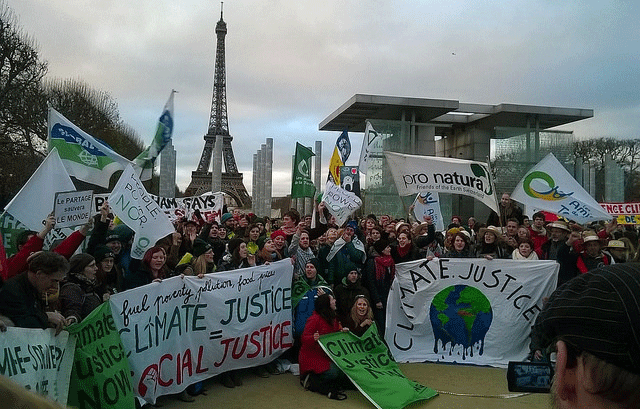This is the first installment in a series of articles that Young Friends of the Earth activists are launching which tell the story of our growing movement for social and environmental justice and against dirty energy and corporate power.
Repression seems to be our governments’ increasingly widespread recipe for stopping the peoples’ struggles for justice and basic rights.
During the COP21 in Paris, the governmental repression of social movements took a sinister turn. The state of emergency declared by the French government served as a major obstacle against the social mobilization around the COP21. While the Christmas markets, a supreme symbol of never-ending material consumption, and sports events ran smoothly during the two weeks of the Climate Conference, street actions were severely restricted during the two weeks of the Climate Conference, and the massive mobilizations planned for Sunday November 29th and Saturday December 12th were banned.
A historical perspective can help better understand the muting of the voices for climate justice during the COP21. Indeed already in the late 90s the mobilization of the global justice movement during international gatherings against the neoliberal hegemony was coupled with police repression, led by coercive strategies, including violence, harassment, and surveillance. This kind of coercion is particularly duplicitous considering it is put in practice by the Western so-called democratic countries when hosting global anti-capitalist gatherings.
As a growing climate justice movement we should build our collective memory around our past wounds. The coercion endured in Paris was the tip of the iceberg of a longstanding threat upon the right to demonstrate for climate justice and system change. Still at every attempt to quieten us we didn’t just slip away. Two key dates for the emergence of the global justice and climate justice movement should be remembered.
During the World Trade Organization Summit in Seattle in 1999 peaceful anti-globalization demonstrators were harshly attacked and imprisoned by the local police. In retrospect, the Summit represents a memorable momentum for the contesting global mobilizations to come. In Seattle, Southern countries’ demands at the WTO found an ally in the global justice protestors on the streets outside. Ten years later, in 2009, our fellows in Copenhagen during the COP15 climate talks also endured harsh repression. The civil disobedience action “Reclaim the Power” which happened on December 17th 2009, close to the negotiations at the Bella Center, was severely shut down by the Danish police who brutally kicked out more than 2,000 people from the Social Movement Assembly and arrested more than 230 people.
Of course, as well as challenging the closing of democratic space in our own countries, we must also stand in solidarity with environmental activists throughout the world who face serious human rights violations every day in their struggles against transnational corporations who exploit their communities.
In Paris, the absurdity of the bans we endured came to light by the end of the Conference. One by one the bans on the events and actions planned for the last day, on December 12th, were withdrawn. On Friday 11th, the gathering at the Champs de Mars on the 12th afternoon was authorized. The very same morning of December 12th the Red Lines action was allowed too. Overall the state of emergency allowed the French authorities to commit abuses against the ecologist French activists during the COP21 and also favored an increased stigmatization of French Muslim.
However, increasing the intensity of police repression won’t silent the climate justice movement. Social protests in general and particularly those that took place in Paris, adapt their strategies to resist the repression they have to deal with.
In spite of the constrained possibilities for demonstrating imposed on us, the climate justice movement never stopped being active in the Parisian streets. Young Friends of the Earth Europe have been supporting the voices of impacted communities and struggles against racism and borders as we have also been challenging the corporate elites and targeting the multinationals’ false solutions. The control of the climate talks by a handful of corporations and Northern capitalist countries makes the defense of democracy a question of survival.
On December 12th 2015 our demands for climate justice were also a rallying call for peace and the defense of our democracy. Attempts of repression won’t discourage us, as the climate and social justice movements strengthen every day.
– Written by Camila Rolando and Jamie Gorman

